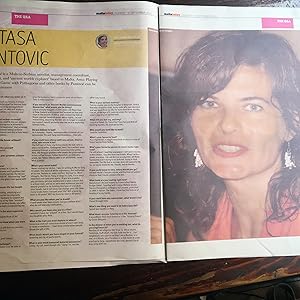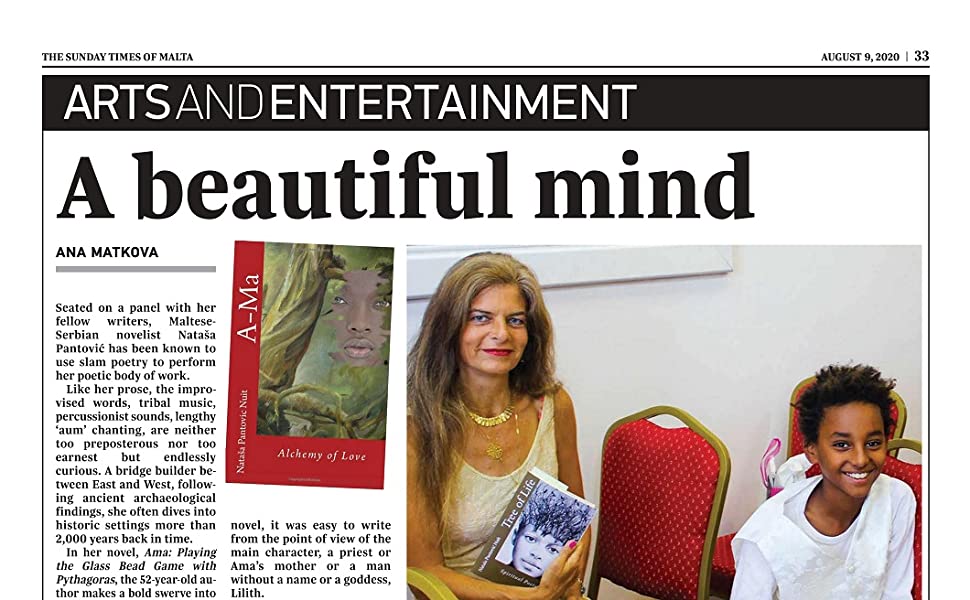
Sunday Times Culture Art Section Interview with Natasa Pantovic, 5 Star Review of Historical Fiction Ama Alchemy of Love set in Age of Enlightenment
All my characters do have strong political, ideological and moral commitments, their ideas are ground-breaking; it is a science against the Church, male against female, East against West conversation.
Holding up a mirror to society of ancient worlds can be fanatical or too obvious within the storytelling environment, so I had to break the rhythm with myths, with art, with dreams.
This novel is, of course, about the search for truth, but from the goddess perspective, about love and union, of the priestesses that have given us the first commandment “Do not kill...”
In this novel you explore the Age of Enlightenment, and ‘Western’ ancient Greek philosophers. Can you talk about your use of the Eastern concept of ‘mindfulness’ in this context?
There are a number of ‘instant happiness’ gurus out there, I do not believe in a ‘get rich in a day’ message, but I do believe that if we learn how to listen to our soul, we will be able to live our highest potential.
We live in a rapidly changing world. When I was born in Belgrade in 1968, at the time of no TV or internet, the population on the planet was three billion. Now they say it is seven billion.
The changes I have seen during my lifetime are huge. Emotionally, mentally and physically, we have to adopt different behaviour patterns, not just to survive, but to thrive without abusing other social groups or animals or endangering planet Earth.
The next stage, the stage of cultural life, is beyond the knowledge of more than 90 per cent of the population.
Having a percentage of the population that neither collects objects nor watches TV, nor reads newspapers, that is still capable of thinking, un-hypnotised, to appreciate art, or dance or sing, and is able to think creatively, is a part of my research fascination.

Ama De-Nobille Fiction Character living in China Macao at the Age of Enlightenment
China, at the Age of Enlightenment, was the cultural, political or economic center of the world. In response to the British request to recognize Macartney as official ambassador, the Emperor wrote:: "The Celestial Empire, ruling all within the four seas, simply concentrates on carrying out the affairs of Government properly... We have never valued ingenious articles, nor do we have the slightest need of your country's manufactures, therefore O King, as regards to your request to send someone to remain at the capital, which it is not in harmony with the regulations of the Celestial Empire – we also feel very much that it is of no advantage to your country." In the late Ming and Qing dynasties, there was a belief in Chinese cultural circles that knowledge entering China from the West had already existed in China in the past. China was "all under heaven" and the philosophers have considered it "the civilized world".

Ottavio de Nobille (1572 - 1641), Ama's father, was a Portuguese physician, alchemist, theologian, and philosopher of the Renaissance's Age of Enlightenment.
A fiction character, a pioneer in several aspects of the "alchemy" of the Renaissance, was deeply influenced by Leonard da Vinci, and Giordano Bruno. Born in Lisbon, Most of the Portuguese expeditions of the Age of Discovery left Lisbon during the period from the end of the 15th century to the beginning of the 17th century. During this time 3,000 Jews were massacred in Lisbon. He attempted to publish an extended treatise on "alchemy", but its publication was prohibited. Now married to Ama's mother, a Kenyan Queen, who he saved from slavery, he attempted the journey across the Ocean, to China, ending his voyage in Macao. The Battle of Macau in 1622 was a conflict of the Dutch – Portuguese War. The Portuguese, outnumbered and without adequate fortification, managed to repel the Dutch. Ottavio's Alchemia magna was completed in 1607, but published only in 1631 in the publishing press of Macao that he co-financed. It is a treatise on alchemy, and magic. The owner of the coffee shop "Ole".

A-Ma Voted Best Historical Fiction Book by Goodreads Users in Alchemy / Goddess Novel Lists
A-Ma voted as best Historical Fiction by Goodreads users in the Lists: Goddess books, The Path of the Divine Feminine, researching Macao, ancient China and Alchemy during the Age of Enlightenment, Best Alchemy Books as voted by new readers.

Nataša Pantović is a Maltese-Serbian novelist, management consultant, adoptive parent, and ‘ancient worlds explorer’ based in Malta.
What’s the first thing you do when you wake up in the morning?
Meditate in an attempt to recall my dreams. A dream diary is the most beautiful technique I’ve learned from Jung – he understood dreams to be messages from the unconscious, and through his own self-analysis, containing imagery that illustrates our internal soul “messaging” system.
What is the best advice you’ve ever received?
My dad, who had a PhD in law, used to discuss ancient philosophers with me, introducing me to Aristotle’s ‘eudaimonia’ - the “long-term happiness” that achieved throughout a lifetime when human beings achieve health, wealth, knowledge, friends and this in turn leads to the perfection of human nature...
 “A-Ma: Alchemy of Love”, um livro cuja acção se passa na Macau do século XVII. Agora, em entrevista ao jornal Times of Malta, a autora, Nataša Pantović, explica que o romance “é sobre a busca pela verdade”. A história tem como protagonista Ama, uma sacerdotisa africana.
“A-Ma: Alchemy of Love”, um livro cuja acção se passa na Macau do século XVII. Agora, em entrevista ao jornal Times of Malta, a autora, Nataša Pantović, explica que o romance “é sobre a busca pela verdade”. A história tem como protagonista Ama, uma sacerdotisa africana.




